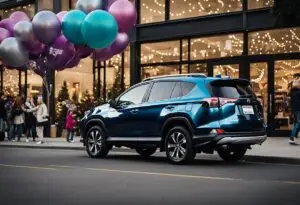Buying a car is a significant investment, and preparation is key to making an informed decision. A crucial step before purchasing a car is taking a test drive. This allows the buyer to assess comfort, vehicle performance, and visibility, ensuring the car meets your personal needs and preferences.
It is also essential to consider your budget and financing options, comparing prices and features across different models. This comprehensive approach helps to avoid overspending and ensures that the vehicle aligns with your lifestyle and financial situation.
Treating the car-buying process as a business transaction rather than an emotional one can make a big difference. It’s important to remember that the goal is to secure the best possible deal, keeping stress levels in check throughout the negotiation phase. Following these steps can help any potential buyer approach this major purchase with confidence and clarity. The last thing you want to do is walk away with buyer’s remorse.
Understanding Your Needs
Before buying a car, it is essential to determine your budget, how you plan to use the vehicle, and the type of vehicle that best suits your requirements. This ensures you make an informed decision and select a car that fulfills both your practical and financial needs.
Assessing Your Budget
Determining your budget is crucial. Consider not just the purchase price but also additional costs such as insurance, maintenance, and fuel. New cars tend to have higher depreciation rates. Within the first year, a new car can lose about 20% of its value, decreasing to around 60% over five years. Calculate all these factors and decide whether a new or used car fits your financial situation.
Budget Breakdown
- Purchase Price: Initial cost of the car.
- Insurance: Recurring monthly or annual cost.
- Maintenance: Regular and unexpected repair costs.
- Fuel: Mileage and fuel efficiency impact this cost.
- Depreciation: Loss of value over time.
Determining Your Vehicle Use
Identify how you intend to use the vehicle. This impacts your choices significantly. For instance, long commutes might necessitate a fuel-efficient car, while off-road driving requires a sturdy SUV. Families might prefer spacious minivans. Evaluate your driving patterns, frequency, and passenger needs.
Considerations for Vehicle Use
- Commutes: Daily travel distance and frequency.
- Terrain: Smooth highways vs. rugged terrains.
- Passenger Count: Capacity requirements.
- Cargo Needs: Amount of luggage or equipment.
Choosing the Right Car Type
Selecting the right car type affects comfort and functionality. Evaluate various car types such as sedans, SUVs, trucks, and minivans. Sedans are typically fuel-efficient and suitable for city driving, while SUVs offer more space and power for off-road and family use. Trucks are ideal for hauling and towing, and minivans cater well to large families.
Car Types and Uses:
- Sedans: Good for urban use and daily commutes.
- SUVs: Suitable for families and off-road driving.
- Trucks: Best for towing and hauling heavy loads.
- Minivans: Perfect for large families and group travel.
Making these assessments will ensure you pick a vehicle that meets your personal needs and fits within your financial limits.
Financial Considerations
Before purchasing a car, analyzing costs, exploring financing options, and understanding insurance premiums is crucial. These steps ensure that the buyer is making a financially sound decision that aligns with their budget.
Analyzing Total Ownership Costs
It’s essential to calculate the total cost of owning a vehicle beyond the purchase price. This includes fuel costs, maintenance and repairs, depreciation, licensing, and registration fees. New car buyers should also consider the long-term expenses related to automobile taxes and potential future repairs due to wear and tear.
Creating a detailed budget that encompasses these factors helps in understanding the true cost over the car’s lifespan.
Buyers can use resources such as Kelley Blue Book’s car cost calculator to get an accurate estimate of these expenses.
Exploring Financing Options
When buying a car, financing plays a pivotal role. Options typically include dealer financing, bank loans, or credit unions.
Each option comes with different interest rates and repayment terms. It’s important to compare these options to determine which offers the best Annual Percentage Rate (APR). A lower APR means less interest paid over the life of the loan, saving money. For example, dealer financing might offer promotional rates, but a local bank or credit union could provide more favorable terms.
Additionally, buyers should carefully read and understand the terms to avoid potential pitfalls, such as prepayment penalties or hidden fees.
Understanding Insurance Premiums
Car insurance is another significant financial consideration. Premium costs vary based on factors such as the vehicle’s make and model, the buyer’s driving history, and geographic location.
Conducting thorough research and getting multiple quotes can help in finding the best coverage at the most affordable price. Some cars may have higher premiums due to parts availability and repair costs. Understanding these factors can be helpful when choosing a car.
Using tools available from companies like Consumer Reports can assist in estimating insurance costs for different vehicles. Regularly reviewing and updating the insurance policy can also ensure it remains competitive and affordable.
Research and Comparison

Before making a purchase, conducting thorough research and comparing different options can help buyers make informed decisions. This detailed examination covers various aspects of evaluating car models, checking safety and reliability, and reading expert and consumer reviews.
Evaluating Car Models
When considering a new vehicle, evaluating different car models is crucial. Buyers should explore various model types, considering their needs and preferences. Factors like size, fuel efficiency, and technology features are essential.
For example, a family may prioritize an SUV for its spaciousness, while a commuter might look for a fuel-efficient sedan. Websites like Kelley Blue Book and Edmunds offer tools to compare different car models based on features, pricing, and specifications. This helps in making an informed choice.
Checking Safety and Reliability
Safety and reliability should never be compromised when purchasing a car. Prospective buyers should review safety ratings from sources like the National Highway Traffic Safety Administration (NHTSA) and the Insurance Institute for Highway Safety (IIHS).
Reliability ratings from Consumer Reports and J.D. Power provide insights into long-term performance and potential issues. Asking about warranty options and checking recall histories are also vital steps in ensuring the car meets safety standards and reliability expectations.
Reading Expert and Consumer Reviews
Reading expert and consumer reviews provides a well-rounded view of a car’s performance and user satisfaction. Expert reviews from sites like U.S. News and Edmunds offer technical insights and detailed evaluations of new car models.
Consumer reviews, available on platforms like Consumer Reports and various automotive forums, share real-world experiences, highlighting common issues or praises that may not be apparent in official reviews. Combining both expert opinions and consumer feedback can help in identifying any recurring problems and understanding how a car performs in everyday use.
Inspection and Test Drive

Before purchasing a car, it is crucial to thoroughly inspect the vehicle and take a comprehensive test drive if it’s a preowned vehicle. If it’s a new car and you’ve already driven this vehicle model before, then it’s not as important to have a test drive. These steps help ensure the car meets your needs and that there are no hidden issues.
Inspecting Vehicle Condition
Start by examining the car’s exterior. Look for scratches, dents, and rust on the body. Pay special attention to the wheel wells, panels beneath the doors, and door bottoms. Open and close all doors, the hood, and the trunk to test for smooth operation.
Check the condition of the tires, looking for uneven wear which could indicate alignment problems. Inspect the lights and ensure all are functioning correctly. Inside the car, look for signs of wear and tear on the seats and dashboard. Unpleasant odors could indicate problems like mold or water damage. Remove floor mats and inspect for wet spots.
Assess the electronic components, such as the infotainment system, heating, and air conditioning, to confirm they are working properly. Finally, review the engine bay for leaks or worn belts.
Taking a Comprehensive Test Drive
A thorough test drive is essential to evaluate the car’s performance. Begin with a cold start of the engine; listen for any unusual sounds. Drive on different road types, including highways, city streets, and winding roads. Pay attention to how the car accelerates, brakes, and handles.
Test the car’s responsiveness in various conditions, such as quick stops and sharp turns. Make sure to try this at different speeds. Feel for any vibrations or unusual noises that may indicate mechanical issues.
Check the comfort of the car’s ride. Ensure that the seats provide adequate support and that there is sufficient legroom. Evaluate the visibility from the driver’s seat. Finally, assess if the steering is responsive and if the car maintains its course without significant correction.
Understanding Existing Warranties
Understanding the warranty coverage is pivotal before finalizing a purchase. Ask the seller for details on any remaining factory warranty and whether an extended warranty is available. This can save significant costs in case of future repairs.
Ensure you get the warranty terms in writing. Verify if the warranty can be transferred to a new owner, as this can add value to your purchase. For used cars, inquire about any third-party warranties. Always confirm which parts and services are covered and which are excluded.
Negotiation and Purchase

Effective negotiation and making dealerships compete are crucial when buying a car from a dealership. If you only walk into one dealership you have no way of knowing if you are getting a good deal or not.
Learning Negotiation Tactics
Before entering into negotiations, research the car’s fair market value. Utilize online resources such as Car and Driver and Edmunds.
Start with your lowest reasonable offer. Be prepared to counter with evidence supporting your offer, such as recent sale prices in your area.
Stay calm and be willing to walk away if the deal doesn’t meet your expectations. If you feel pressured, ask to speak with a sales manager or a different salesperson.
For truck deals, highlight your research on common issues and preferences in truck models. This shows the dealer that you are well-informed.
Finalizing the Sale
Once the price is agreed upon, it’s time to negotiate any additional services or products. This includes trade-ins, financing terms, and warranties.
For trade-ins, get estimates from multiple sources to ensure you receive a fair trade-in value. Always negotiate the car price before discussing your trade-in.
For financing, get pre-approved for a loan before visiting the dealership. This helps you compare dealership financing offers more effectively.
Be wary of add-ons and unnecessary extras. It’s better to firmly say no to products that don’t add value to your purchase.
Handling Paperwork and Legalities
Review all documents carefully before signing. Ensure all verbal promises and negotiated terms are documented in the final papers.
Double-check the purchase agreement, financing terms, and warranty details. Look for errors or extra charges that weren’t disclosed during negotiations.
Confirm the vehicle identification number (VIN) on the car matches the paperwork. Verify that all appropriate taxes and fees are accurately listed.
For trucks, ensure any specific requirements, such as commercial use or towing capacity, are covered in the documentation.
Keep copies of all signed documents for your records. This will help if disputes arise in the future.
Post Purchase Considerations

Once you have purchased your car, it’s essential to keep it in top condition and handle all necessary legal requirements. Focusing on routine maintenance and ensuring proper registration will help maintain the vehicle’s value and avoid legal issues.
Schedule Maintenance
Regular maintenance is crucial to ensure the longevity and performance of the car. The owner should check the manufacturer’s manual for a detailed maintenance schedule. Routine tasks usually include oil changes, tire rotations, brake inspections, and fluid level checks.
Dealerships often provide maintenance packages that may cover the first few services. Independent mechanics can also perform these tasks, sometimes at a lower cost. Keep records of all maintenance activities as they can prove useful for future resale.
After purchasing the car, registering the vehicle with the local Department of Motor Vehicles (DMV) is essential. This process usually involves filling out forms, providing proof of ownership, and paying registration fees.
New car owners should also be aware of the taxes that may be due at the time of registration. These taxes can vary significantly depending on the location and the vehicle’s value. It’s advised to budget for these expenses to avoid any financial surprises.
Frequently Asked Questions
When buying a car, it’s crucial to consider multiple factors, ensure all necessary documents are gathered, and prepare effectively for negotiations. For first-time buyers, understanding what to inspect and how to secure a deal is essential.
Verify the car’s history report to check for any accidents or major repairs.
Arrange for a trusted mechanic to inspect the vehicle.
Confirm that the VIN on the car matches the one on the title.
What are the essential documents needed when buying a car from a dealership?
Ensure you have a valid driver’s license for identification.
Bring proof of insurance.
Review the bill of sale and financing documents carefully before signing.
How can one secure the best possible deal when purchasing a new car?
Research the car’s market value and compare prices from various dealerships.
Time your purchase strategically, such as during end-of-year sales events.
Consider obtaining pre-approved financing to potentially negotiate a lower price.
What are the critical steps to take when buying a car for the first time?
Determine your budget, including the cost of insurance and maintenance.
Test drive multiple cars to assess comfort and handling.
Review consumer reports and ratings to choose a reliable model.
What should you inspect when considering the purchase of a used car?
Check for any signs of damage, rust, or wear on the exterior and interior.
Look over the tire treads and examine the brakes.
Request a vehicle history report to identify any past issues or accidents.
How should you prepare for negotiations with a car dealer?
Research the invoice price of the car to understand its true value.
Be ready to walk away if the price doesn’t meet your budget.
Have a clear maximum price in mind before entering negotiations.







